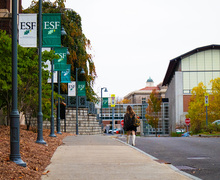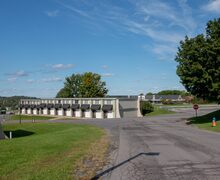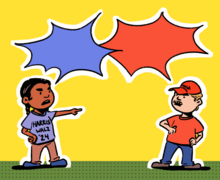Upheaval in Haiti prompts debate in SU community
While some students may link the Caribbean to spring break plans, its sun and sand were far from the minds of some members of the university community last night.
Nearly 25 students and professors attended a discussion Wednesday night about the current situation in Haiti, where former President Jean-Bertrand Aristide resigned Sunday and a national rebellion continues to escalate.
‘We thought it’d be a really good idea to generate discussion and shed light on the story that often falls on deaf ears,’ said James Desrouleaux, a junior economics major and vice president the Haitian American Students Association, which sponsored the discussion.
The power struggle between the Haitian government and the opposition groups did not just spring up within the past month but started brewing in 2000, said Marlie Doucet, a junior nutrition major. Haitian citizens from all classes then began to dispute Aristide’s presidency.
‘Everyone – civilians, businessmen, the bourgeoisie, the poor – they were all out there protesting against Aristide,’ Doucet said.
But some of the participants said that the Haitians were not solely responsible for Aristide’s oust, and that the United States has played a large role in the conflict.
‘What are the power struggles going on beyond the country?’ said Linda Carty, chairperson of the African American studies department. ‘What are the other stories? How much of this is U.S. generated?’
Carty read a segment of a petition created this week by Caribbean and Caribbean-American women, which denounced the U.S. backed coup of Aristide for several reasons, including the fact that the president did not finish his democratically elected term.
‘This is being orchestrated from within this country. They created Osama bin Laden; they created the Taliban,’ Carty said. ‘It’s the history of the U.S. involvement in the free world – it’s cyclical, it’s historical.’
The United States feels that it must get involved with many other international conflicts, not only the one in Haiti, said Jose Vilson, a senior computer science major.
‘The U.S. has to stop meddling,’ Vilson said. ‘If they’re going to have this revolution, it has to be about the people, not about the U.S.’
But some of the panelists supported the U.S. pressure on Aristide to resign.
‘People were celebrating when (Aristide) left, even if it was orchestrated,’ said Isabelle Vasquez, a junior chemical engineering major. ‘It’s a good thing for the country.’
Aristide’s election was not a truly democratic one, as his supporters claim, Vasquez said.
‘Saying he was democratically elected is really a stretch to say the least,’ Vasquez said, who was in Haiti during its 2000 election. ‘There were random killings, shootings everywhere, the day of the election. Most of the people did not get out of their houses for fear of violence.’
Some participants said the American media offers a limited view of the situation in Haiti and discussed where people can find more media coverage on the issue that presents different viewpoints of the situation.
‘I always see negative images of heightened violence,’ said Phillip Mondestin, a junior economics major and president of HASA. ‘We hardly ever see anything positive.’
But the recent media attention prompted some participants to do more research about Haiti’s history and the current struggles before they could form an opinion.
‘We need to look at the history to understand what’s going on,’ Vilson said. ‘I know I needed to get the background before I could start reacting.’
The media tends to portray either the rebels or the government as the people to blame, said Warren Howe, a senior political science major.
‘Who wants Haiti to be better: the rebels or Aristide?’ Howe said. ‘It’s hard to tell whose motive is more true. The last thing I want to do is make it about the good guy versus the bad guy.’
‘Our common goal is to see Haiti a better nation,’ Howe added.
While the participants of the discussion group could not reach an easy consensus about the situation, Mondestin said that the mix of professors and students helped to further educate and broaden viewpoints.
‘We had a good balance of expressed opinions and voices,’ Mondestin said.
But more students should make an effort to educate themselves about the Haitian conflict, especially African-American students, Howe said.
‘This is very monumental to our history, whether people recognize it or not,’ Howe said. ‘When the time comes, we’ll take the steps necessary to make good change.’
Published on March 3, 2004 at 12:00 pm





